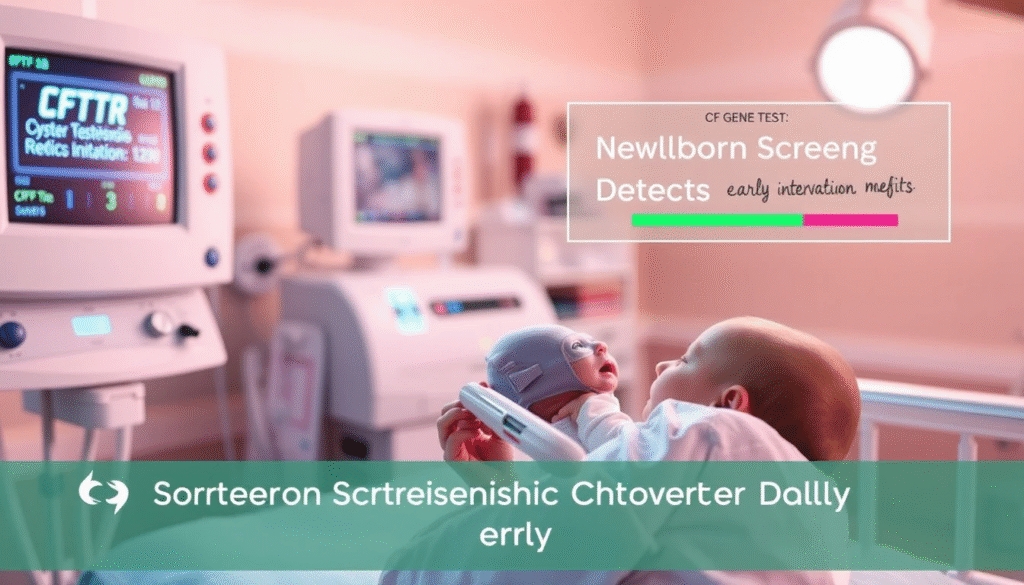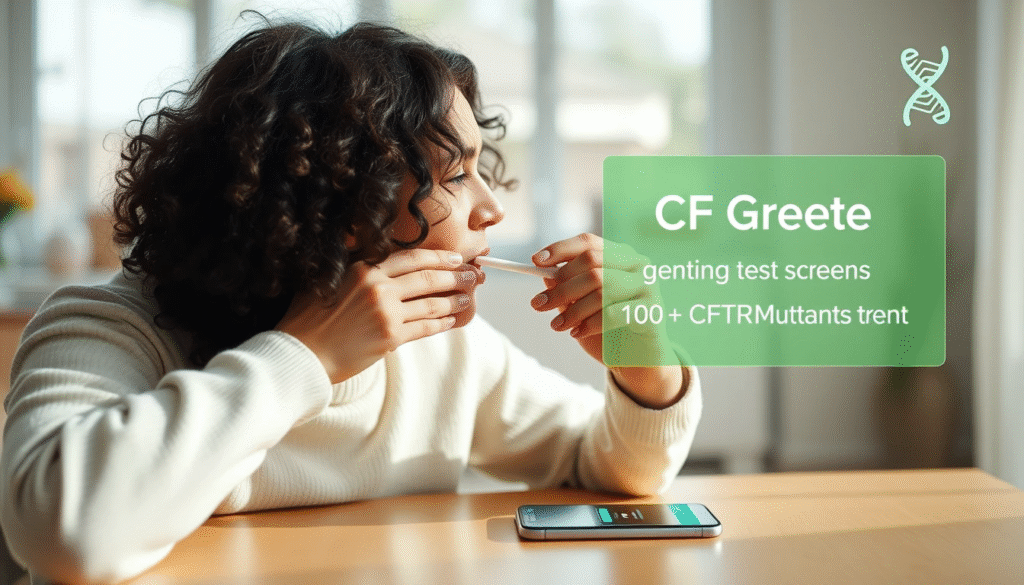According to the National Library of Medicine, around 1 in 3,000 to 4,000 Caucasian neonates are affected by cystic fibrosis (CF). It’s important to know if you have the CF gene, particularly when making plans for a family. By 2025, it will be easier than ever to get a cystic fibrosis gene test, which will reveal your genetic risk.
This handbook describes the cystic fibrosis gene test, offering concise information, professional guidance, and doable actions to assist you in making health-related decisions.
Many Don’t Know About CF Gene Testing
Cystic fibrosis is a hereditary condition that affects the lungs and other organs. It is caused by mutations in the CFTR gene. According to Genetics in Medicine, although 1 in 25 to 30 Caucasians are carriers of the cystic fibrosis gene, many people are unaware of the test.
Couples may not be aware of their risk of transferring CF to their offspring if they do not comprehend the test.
Uncertainty results from this ignorance. Do you need to be tested? What does it mean to be a carrier? You can lose the opportunity to determine your risk if you are unaware of the cystic fibrosis gene test, which would leave you unprepared for any health issues in your family.

The Risks of Not Testing for the CF Gene
Serious repercussions may result from failing the cystic fibrosis gene test. According to the Cystic Fibrosis Foundation Patient Registry, 93.9% of CF patients in the United States were Caucasian in 2020, demonstrating the prevalence of the disease in this demographic.
According to the American College of Medical Genetics, there is a 25% probability of conceiving a kid with cystic fibrosis (CF) with every pregnancy if both parents are carriers. Ignoring the cystic fibrosis gene test can lead to an unanticipated diagnosis of CF, which necessitates lifelong medical treatment.
The financial and emotional toll is substantial. According to Psychosomatic Medicine, 15% of couples who learned they were both CF carriers upon a child’s diagnosis in 2021 reported experiencing severe levels of stress.
Research published in the Journal of Cystic Fibrosis in 2022 found that the average yearly expense of CF care can surpass $40,000. Families dealing with these issues may not be prepared if the cystic fibrosis gene test is not used.
Understanding the Test for the Cystic Fibrosis Gene
The cystic fibrosis gene test is a simple method of determining your risk in 2025. With the use of facts, a case study, and professional opinions, this part describes the test’s operation, who should take it, and what to do with the findings.
What Is the Test for the Cystic Fibrosis Gene?
A genetic screening that detects mutations in the CFTR gene is the test for the cystic fibrosis gene. Usually, a cheek swab or blood sample is used. All couples considering a pregnancy, especially those of Caucasian heritage, should be offered this test, according to the American College of Obstetricians and Gynecologists.
Types of Testing
- Carrier Screening: Checks if you carry a CFTR mutation. A 2013 study in Genetics in Medicine found that standard panels detect 85–90% of carriers in Caucasians.
- Newborn Screening: Measures immunoreactive trypsinogen (IRT) levels in newborns. If elevated, a sweat chloride test confirms CF, per the Cystic Fibrosis Foundation.
- Prenatal Testing: Tests the fetus if both parents are carriers. Chorionic villus sampling (CVS) or amniocentesis is 98% accurate, per UCSF Health.
The test for the cystic fibrosis gene helps you understand your carrier status and take proactive steps.

Who Should Get the Test for the Cystic Fibrosis Gene?
Certain groups are more likely to benefit from the test for the cystic fibrosis gene.
High-Risk Ethnic Groups
According to Clinical Chemistry, the carrier rate is higher among Caucasians (1 in 25 to 30) than among African Americans (1 in 79). It is frequently advised to get tested for the cystic fibrosis gene if you are Caucasian.
Family History
Testing is essential if CF runs in your family. 20% of CF cases had a known family history, according to a 2022 study published in the Journal of Pediatrics. For these people, testing for the cystic fibrosis gene is crucial.
Couples Planning a Family
Tests should be performed on couples before pregnancy. According to the American Journal of Obstetrics and Gynecology, 70% of Caucasian couples who tested before becoming pregnant in 2024 reported feeling more prepared, demonstrating the usefulness of the cystic fibrosis gene test.
How the Test Is Performed
The test for the cystic fibrosis gene is simple and quick. Here’s the process:
- Sample Collection: A blood draw or cheek swab is taken at a lab or doctor’s office.
- Analysis: The sample is analyzed for CFTR mutations. Standard panels screen for 23 to 69 mutations, per UCSF Health.
- Results: Results are typically available in 1–2 weeks. A positive result means you’re a carrier; a negative result reduces but doesn’t eliminate risk.
This process makes the test for the cystic fibrosis gene accessible and efficient.
Using the Test for the Cystic Fibrosis Gene
A 2024 case study of a 30-year-old couple highlights the impact of the test for the cystic fibrosis gene.
- Profile: Caucasian, planning their first child, no known family history of CF.
- Challenges:
- Unaware of their career risk.
- Concerned about potential health issues for their baby.
- Interventions:
- Both underwent carrier screening with a 69-mutation panel.
- Received genetic counseling to interpret results.
- Results: The woman tested positive; the man tested negative. Their risk of having a child with CF dropped to less than 1%.
- Key Insight: The test for the cystic fibrosis gene provided clarity and reduced their anxiety about family planning.

What to Do If You Test Positive
A positive result means you’re a carrier, but it doesn’t mean you have CF. Here’s what to do after the test for the cystic fibrosis gene:
Partner Testing
Your spouse should also get tested for the cystic fibrosis gene if you are a carrier. According to the American College of Medical Genetics, there is a 25% risk of conceiving a child with cystic fibrosis if both are carriers.
Genetic Counseling
Understanding your alternatives is aided by counseling. According to the Journal of Genetic Counseling, 80% of couples who sought counseling following a positive test reported feeling more prepared in 2023. Following the cystic fibrosis gene test, this step is essential.
Prenatal Testing
Prenatal diagnostics such as amniocentesis or CVS can evaluate the fetus if both couples are carriers. Following the test for the cystic fibrosis gene, UCSF Health reports that these tests are 98% accurate.
Preimplantation Genetic Testing (PGT)
PGT can stop the spread of CF during IVF. According to a 2024 study published in the Journal of Cystic Fibrosis, PGT use rose by 33% among carrier couples, indicating that there are options accessible following the cystic fibrosis gene test.
Benefits of Testing
The test for the cystic fibrosis gene offers several advantages:
- Early Awareness: A 2022 study in the Journal of Pediatrics found that early screening reduced CF births by 10% in tested populations.
- Informed Decisions: Testing allows couples to explore options like PGT or adoption.
- Reduced Anxiety: Knowing your status lowers stress, per a 2023 study in Psychosomatic Medicine.
These benefits make the test for the cystic fibrosis gene a valuable tool for family planning.
Expert Insight: “Testing can empower families,” says Dr. Emily Watson, a geneticist at Stanford University. “The test for the cystic fibrosis gene gives you the knowledge to plan for a healthy future.”
Challenges in Accessing CF Gene Testing
Not everyone can easily access the test for the cystic fibrosis gene due to various barriers.
Cost and Insurance
Without coverage, testing might be costly. According to the Kaiser Family Foundation, 10% of American households were unable to pay for genetic testing in 2021, which restricted access to the cystic fibrosis gene test.
Awareness Gaps
Many people are unaware. According to a 2022 study published in the Journal of Public Health, 30% of Caucasians delayed getting tested for the cystic fibrosis gene because they were not aware of the screening recommendations.
Ethnic Disparities
For non-Caucasians, standard panels are less effective. According to a 2020 study published in Genetics in Medicine, 44% of carriers from a variety of groups were overlooked, underscoring the test’s shortcomings for certain populations when it comes to the cystic fibrosis gene.

Future Trends in CF Gene Testing
In 2025, advancements are improving the test for the cystic fibrosis gene.
- Expanded Panels: Next-generation sequencing (NGS) detects over 2,000 mutations, per Nature Genetics, increasing accuracy.
- Telehealth Counseling: Virtual access is growing. In 2024, 50% of genetic counseling sessions were virtual, per the American Telemedicine Association.
- Public Awareness: The Cystic Fibrosis Foundation’s campaigns increased screening rates by 20% in 2024, per their annual report.
X Insight: A 2024 @CFF post noted, “NGS panels are making CF gene testing more accurate than ever.”
Conclusion
In 2025, the cystic fibrosis gene test is a useful tool for determining your genetic risk, particularly if you intend to start a family. Given that the carrier frequency among Caucasians is 1 in 25 to 30, testing can provide light and assist you in making wise choices.
You may lessen your fear and make plans for a healthy future by getting tested for the cystic fibrosis gene, speaking with genetic counselors, and considering your alternatives. Remain proactive; your greatest strength is knowledge.
FAQs
Q: What is the test for the cystic fibrosis gene?
A: It’s a genetic screening that checks for CFTR mutations using a blood sample or cheek swab.
Q: Who should take the test for the cystic fibrosis gene?
A: Caucasians, those with a family history of CF, and couples planning a family should consider it.
Q: How accurate is the test for the cystic fibrosis gene?
A: Standard panels detect 85–90% of carriers in Caucasians, per research.
Q: What happens if I test positive on the test for the cystic fibrosis gene?
A: Your partner should get tested, and you can consult a genetic counselor for next steps.
Q: Are there new advancements in the test for the cystic fibrosis gene in 2025?
A: Expanded NGS panels and telehealth counseling are improving accuracy and access.
Q: Why do some people not take the test for the cystic fibrosis gene?
A: Cost, lack of awareness, and ethnic disparities in testing accuracy create barriers.
Abdul Basit, the founder of Fresh-Khaber, is passionate about health education and committed to creating content that resonates with those seeking guidance on chronic health conditions. Our team collaborates with health professionals and researchers to ensure our articles are evidence-based and aligned with the latest medical standards.

